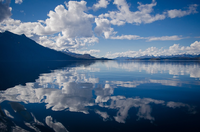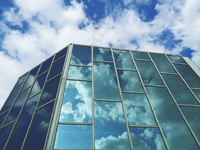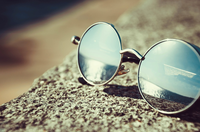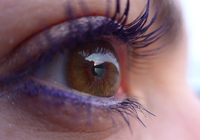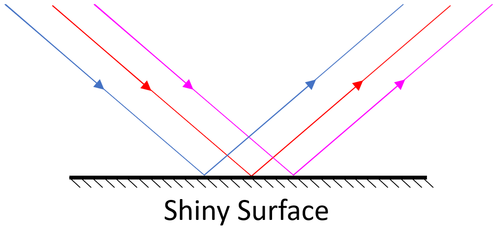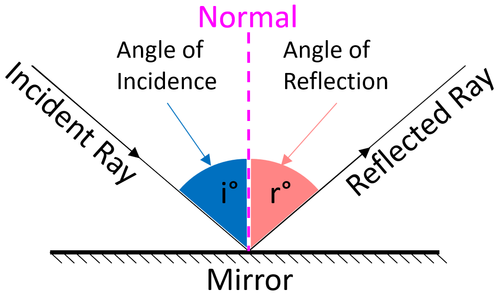Difference between revisions of "Specular Reflection"
(→About Specular Reflection) |
|||
| Line 49: | Line 49: | ||
|- | |- | ||
| style="height:20px; width:200px; text-align:center;" |[[Specular Reflection]] from the [[glass]] makes an [[image]] of the [[sky]] in the [[glass]]. | | style="height:20px; width:200px; text-align:center;" |[[Specular Reflection]] from the [[glass]] makes an [[image]] of the [[sky]] in the [[glass]]. | ||
| + | |} | ||
| + | |||
| + | ==Key Stage 4== | ||
| + | ===Meaning=== | ||
| + | [[Specular Reflection]] is when an [[Electromagntic Wave]] bounces off a flat surface to produce a an [[image]]. | ||
| + | |||
| + | ===About Specular Reflection=== | ||
| + | : [[Specular Reflection]] happens from a shiny surface and makes an [[image]] (you can see a 'reflection'). | ||
| + | {| class="wikitable" | ||
| + | |- | ||
| + | |[[File:SpecularReflectionDiagram.png|center|500px]] | ||
| + | |- | ||
| + | | style="height:20px; width:200px; text-align:center;" |[[Specular Reflection]] happens from a smooth surface. Parallel rays are '''reflected''' and stay parallel to one another. | ||
| + | |} | ||
| + | |||
| + | ===The Law of Reflection=== | ||
| + | : The Law of '''reflection''' states that the [[Angle of Incidence|angle of incidence]] is equal to the [[Angle of Reflection|angle of reflection]]. | ||
| + | {| class="wikitable" | ||
| + | |- | ||
| + | |[[File:ReflectionDiagram.png|center|500px]] | ||
| + | |- | ||
| + | | style="height:20px; width:200px; text-align:center;" |The [[angle]] between the [[Incident Ray|incident ray]] and the [[normal]] ([[Angle of Incidence|angle of incidence]]) is the same as the [[angle]] between the [[Reflected Ray|reflected ray]] and the [[normal]] ([[Angle of Reflection|angle of reflection]]). | ||
|} | |} | ||
Revision as of 08:55, 19 February 2019
Contents
Key Stage 2
Meaning
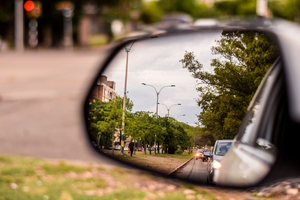
A mirror reflects light so we can see a perfect image.
Reflection from shiny surfaces is when light bounces off a material creating an image that we can see.
About Reflection form Shiny Surfaces
- When a surface is shiny we can see a reflection on the surface.
- A mirror is a shiny piece of metal that reflects all of the light that hits it and allows us to see an image.
- Mirrors are said to be reflective.
- If a surface is dull you cannot see an image and it is not called reflective, but it still reflects the light.
| You can see the reflection of the mountain and clouds on the surface of the water. | The glass reflects the image of the clouds. |
| These glasses are very reflective. | You can sometimes see a reflection is a person's eye. |
Key Stage 3
Meaning
Specular Reflection is when light bounces off a flat surface to produce a an image.
About Specular Reflection
- Specular Reflection happens from a shiny surface and makes an image (you can see a 'reflection').
| Specular Reflection happens from a smooth surface. Parallel rays are reflected and stay parallel to one another. |
The Law of Reflection
- The Law of reflection states that the angle of incidence is equal to the angle of reflection.
| Specular Reflection from the glass makes an image of the sky in the glass. |
Key Stage 4
Meaning
Specular Reflection is when an Electromagntic Wave bounces off a flat surface to produce a an image.
About Specular Reflection
- Specular Reflection happens from a shiny surface and makes an image (you can see a 'reflection').
| Specular Reflection happens from a smooth surface. Parallel rays are reflected and stay parallel to one another. |
The Law of Reflection
- The Law of reflection states that the angle of incidence is equal to the angle of reflection.
| The angle between the incident ray and the normal (angle of incidence) is the same as the angle between the reflected ray and the normal (angle of reflection). |
